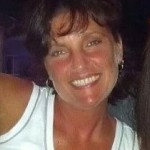 Jean Copeland is a high school English teacher who received her M.S. in English-Creative Writing from Southern Connecticut State University. Her fiction and personal essays have appeared in T/OUR Magazine, Sharkreef.org, Connecticut Review, Texas Told ‘Em, P.S. What I Didn’t Say, Off the Rocks, Best Lesbian Love Stories, Harrington Lesbian Literary Quarterly, The First Line, and Prickofthespindle.com. She also wrote an essay that will appear in the essay collection, A Family by Any Other Name, in early 2014.
Jean Copeland is a high school English teacher who received her M.S. in English-Creative Writing from Southern Connecticut State University. Her fiction and personal essays have appeared in T/OUR Magazine, Sharkreef.org, Connecticut Review, Texas Told ‘Em, P.S. What I Didn’t Say, Off the Rocks, Best Lesbian Love Stories, Harrington Lesbian Literary Quarterly, The First Line, and Prickofthespindle.com. She also wrote an essay that will appear in the essay collection, A Family by Any Other Name, in early 2014.
Jean, this opening chapter of The Revelation of Beatrice Darby finds Beatrice awakening to her own sexuality and attraction to women through her impulsive interest in a dimestore novel about a lesbian romance. Beatrice is a churchgoing girl and this is 1957, in a quaint pharmacy and soda fountain, during a time when “good” girls dated “nice” boys, soon got married, and primarily worked in the kitchen and took care of the kids. Without a doubt, her budding revelation will have consequences on many levels. What inspired you to set the story in this period rather than a more contemporary one?
I’ve had an affinity for that period since discovering my first Doris Day and Rock Hudson film on cable as a teen. But as I researched the social history of the LGBT movement for a class I was going to teach, I was fascinated and humbled by the paradox of that era regarding homosexuals: Life was wholesome and wonderful for “normal” Americans but oppressive and dangerous for anyone brave enough to be out and proud. I could explore that precarious life from the safety of my protagonist, Beatrice Darby.
The excerpt here introduces a number of characters who are instrumental in Beatrice’s life: her mother, her brother Quentin, good friend Robert Carlin, and, of course, Miss Gill. Do they remain key figures as the novel progresses, after (presumably) Beatrice goes away to college and beyond?
Yes, all of those characters continue to be a presence in Beatrice’s life as she transitions into adulthood. One other character, Gwen Ridgeway, is introduced a few chapters later and has quite an impact on the trajectory of Beatrice’s life. And here’s a hint: Abby Gill becomes more than just a librarian…
A re you targeting a particular audience for the novel? The straightforward prose is nice and clean and enjoyable to read. It really captures Beatrice’s story. While it should appeal to readers of all kinds and ages, there would seem to be a definite connection with teen readers who might be coming of age themselves.
My initial intention was to target it toward an LGBT audience, women in particular, but I would be delighted if it found a YA audience as well
As a high school English teacher, how do you find today’s students’ engagement with literature? Are their tastes changing?
I teach in an alternative high school program so engaging my students in literature is sometimes a bit challenging. I usually find success with contemporary non-fiction and stories about people, especially adolescents, overcoming struggles. But what surprised and delighted me was their level of engagement with classics like The Crucible, The Scarlet Letter and The Great Gatsby.
Do you have a completed manuscript of The Revelation of Beatrice Darby? If so, is it something you’re still tinkering with or sending off to agents or editors?
The manuscript is essentially complete. I’m in the polishing stage now so I can resubmit it to a publisher who had expressed some interest if I would consider some major revision. It turns out the editor was right! I like the revised version better and am keeping my fingers crossed they will accept it on the second read!
Any other novels or creative projects currently in the works?
Several characters are living in my mind right now waiting patiently for me to tell their stories, but at the moment, when I’m not teaching, I’m focused on getting Beatrice ready for market
Read Jean Copeland’s excerpt from The Revelation of Beatrice Darby, her novel in progress.
